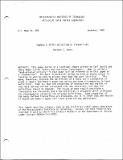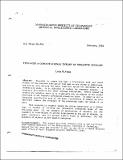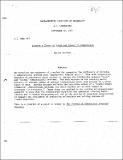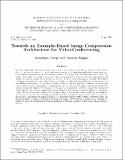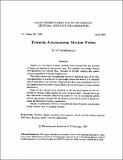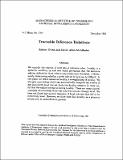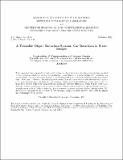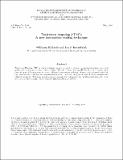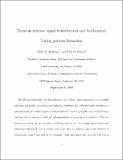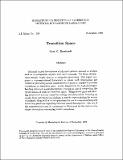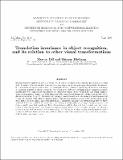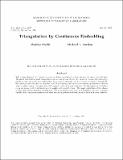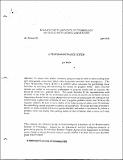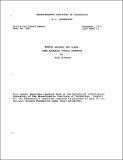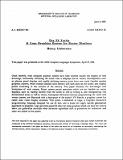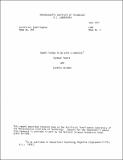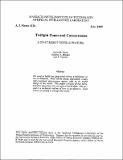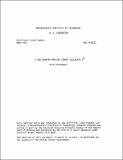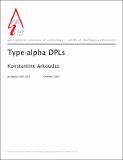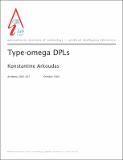Browsing AI Memos (1959 - 2004) by Title
Now showing items 1125-1144 of 1217
-
Towards a Better Definition of Transactions
(1980-12-01)This paper builds on a technical report written by Carl Hewitt and Henry Baker called "Actors and Continuous Functionals". What is called a "goal-oriented activity" in that paper will be referred to in this paper as a ... -
Towards a Computational Theory of Semantic Memory
(1980-02-01)Research in memory has been a frustrating task not least because of the intimate familiarity with what we are trying to understand, and partly also because the human cognitive system has developed as an interactive ... -
Towards a Theory of Local and Global in Computation
(1977-09-01)We formulate the rudiments of a method for assessing the difficulty of dividing a computational problem into "independent simpler parts." This work illustrates measures of complexity which attempt to capture the ... -
Towards an Example-Based Image Compression Architecture for Video-Conferencing
(1994-06-01)This paper consists of two major parts. First, we present the outline of a simple approach to very-low bandwidth video-conferencing system relying on an example-based hierarchical image compression scheme. In particular, ... -
Towards Autonomous Motion Vision
(1992-04-01)Earlier, we introduced a direct method called fixation for the recovery of shape and motion in the general case. The method uses neither feature correspondence nor optical flow. Instead, it directly employs the spatiotemporal ... -
Tractable Inference Relations
(1991-12-01)We consider the concept of local sets of inference rules. Locality is a syntactic condition on rule sets which guarantees that the inference relation defined by those rules is polynomial time decidable. Unfortunately, ... -
A Trainable Object Detection System: Car Detection in Static Images
(1999-10-13)This paper describes a general, trainable architecture for object detection that has previously been applied to face and peoplesdetection with a new application to car detection in static images. Our technique is a ... -
Trajectory Mapping ("TM''): A New Non-Metric Scaling Technique
(1993-12-01)Trajectory Mapping "TM'' is a new scaling technique designed to recover the parameterizations, axes, and paths used to traverse a feature space. Unlike Multidimensional Scaling (MDS), there is no assumption that the ... -
Trans-membrane Signal Transduction and Biochemical Turing Pattern Formation
(1999-09-28)The Turing mechanism for the production of a broken spatial symmetry in an initially homogeneous system of reacting and diffusing substances has attracted much interest as a potential model for certain aspects of ... -
Transition Space
(1990-11-01)Informal causal descriptions of physical systems abound in sources such as encyclopedias, reports and user's manuals. Yet these descriptions remain largely opaque to computer processing. This paper proposes a ... -
Translation Invariance in Object Recognition, and Its Relation to Other Visual Transformations
(1997-06-01)Human object recognition is generally considered to tolerate changes of the stimulus position in the visual field. A number of recent studies, however, have cast doubt on the completeness of translation invariance. In a ... -
Triangulation by Continuous Embedding
(1997-03-01)When triangulating a belief network we aim to obtain a junction tree of minimum state space. Searching for the optimal triangulation can be cast as a search over all the permutations of the network's vaeriables. Our ... -
A Truth Maintenance System
(1979-06-01)To choose their actions, reasoning programs must be able to make assumptions and subsequently revise their beliefs when discoveries contradict these assumptions. The Truth Maintenance System (TMS) is a problem solver ... -
Turtle Escapes the Plane: Some Advanced Turtle Geometry
(1975-12-01)Since the LOGO Turtle took his first step he has been mathematically confined to running around on flat surfaces. Fortunately the physically intuitive, procedurally oriented nature of the Turtle which makes him a ... -
The TV Turtle: A Logo Graphics System for Raster Displays
(1976-06-01)Until recently, most computer graphics systems have been oriented toward the display of line drawins, continually refreshing the screen from a display list of vectors. Developments such as plasma panel displays and ... -
Twenty Things To Do With A Computer
(1971-06-01)When people talk about computers in education they do not all have the same image in mind. Some think of using the computer to program the kid; others think of using the kid to program the computer. But most of them have ... -
Twilight Zones and Cornerstones: A Gnat Robot Double Feature
(1989-07-01)We want to build tiny gnat-sized robots, a millimeter or two in diameter. They will be cheap, disposable, totally self-contained autonomous agents able to do useful things in the world. This paper consists of two parts. ... -
A Two Counter Machine Cannot Calculate 2N
(1972-05-01)This note proves that a two counter machine cannot calculate 2N. -
Type-alpha DPLs
(2001-10-05)This paper introduces Denotational Proof Languages (DPLs). DPLs are languages for presenting, discovering, and checking formal proofs. In particular, in this paper we discus type-alpha DPLs---a simple class of DPLs for ... -
Type-omega DPLs
(2001-10-16)Type-omega DPLs (Denotational Proof Languages) are languages for proof presentation and search that offer strong soundness guarantees. LCF-type systems such as HOL offer similar guarantees, but their soundness relies heavily ...

